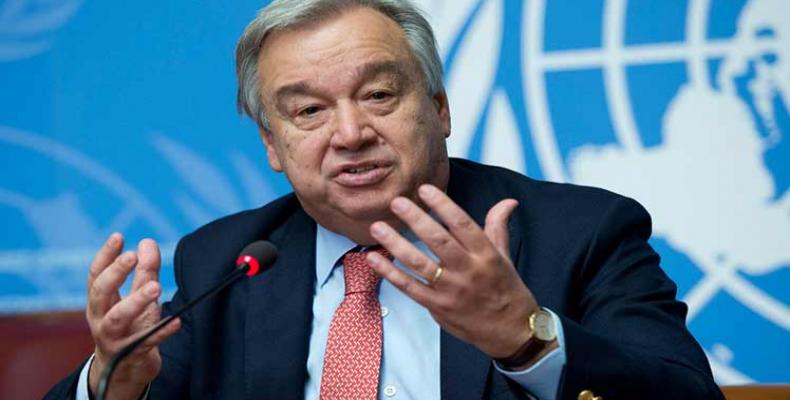Gaza City, August 31 (RHC)-- United Nations Secretary General Antonio Guterres has called for an end to the decade-long Israeli blockade on the Gaza Strip, describing the situation in the coastal Palestinian enclave as one of the most “dramatic humanitarian crises.”
Guterres made the remarks during a visit on Wednesday to a school run by the UN agency for Palestinian refugees, also known as UNRWA, in northern Gaza. The besieged Palestinian territory is undergoing an electricity and water crisis.
"I am deeply moved to be in Gaza today, unfortunately to witness one of the most dramatic humanitarian crises that I've seen in many years working as a humanitarian in the United Nations," Guterres stated.
He added that it was "important to open the closures," in a reference to the Israeli siege of Gaza and Egypt’s closure of Rafah border crossing, the only passageway to the outside world for the impoverished coastal Palestinian sliver.
The UN secretary general wrapped up his three-day visit to the Palestinian territories on Wednesday. The trip was the first of its kind since Guterres took office. During the visit, Guterres met Israeli and Palestinian officials in Jerusalem al-Quds and Ramallah.
The Palestinian resistance movement Hamas welcomed Guterres’ visit, urging him to work for the lifting of the Israeli blockade.
Last month, a UN official warned that Gaza was drawing closer to becoming “unlivable” much faster than previous expectations, as Israel’s all-out blockade continued.
During the UN chief's trip there were demonstrations in Gaza. In one rally, about 25 protesters held a fake coffin with a sign that read: "Welcome to the largest prison in the world."
Elsewhere, demonstrators protested as Guterres' convoy crossed the border with the occupied Palestinian territory into Gaza. They called for action in support of Palestinian prisoners held in Israeli jails. The relatives of detainees were among the demonstrators.
Israel has had Gaza under a blockade since 2007, causing a steep decline in the standard of living as well as unprecedented levels of unemployment and unrelenting poverty.
The Tel Aviv regime has also waged several wars on Gaza since 2008. Hundreds of Gazans have been killed or maimed in the wars and a significant portion of infrastructure has been destroyed.
Israel already enjoys close cooperation from Egypt to implement the all-out land, aerial, and naval embargo on Gaza. Since 2013, Egypt has largely closed off its only shared crossing with Gaza and destroyed hundreds of tunnels that provided a vital lifeline for the economy of Gaza.
UN Secretary General Calls for Lifting of Gaza Blockade

Matérias relacionadas
Comentários
Deixe um comentário
Todos os campos são requeridosMais vistas
- Trump se vangloria de mensagem triunfalista ao Congresso dos EUA
- China e Cuba sublinham o contributo das mulheres para a sociedade
- Cuba estreia sem vitórias na Copa do Mundo de Boxe Juvenil
- Apresentam documentário sobre a cativante compositora cubana Marta Valdés
- Presidente Díaz-Canel reconhece a contribuição dos trabalhadores do Turismo

